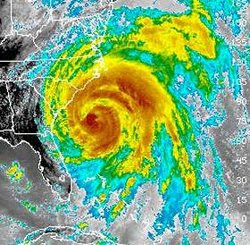 Republicans are weak on national defense. It really is that simple. If the threat is military, then they're strong on defense, but actual military threats to the United States are pretty rare. And they're big on fighting terrorism -- unfortunately, in ways that whittle away the freedom they say they're trying to defend. But get away from those threats and they could really care less. If the threat to the nation is not human, then they really have no interest in it. With Hurricane Irene come and gone, we see that the GOP's message to those affected by disaster, had they had their way, would be "sucks to be you."
Republicans are weak on national defense. It really is that simple. If the threat is military, then they're strong on defense, but actual military threats to the United States are pretty rare. And they're big on fighting terrorism -- unfortunately, in ways that whittle away the freedom they say they're trying to defend. But get away from those threats and they could really care less. If the threat to the nation is not human, then they really have no interest in it. With Hurricane Irene come and gone, we see that the GOP's message to those affected by disaster, had they had their way, would be "sucks to be you."
And, of course, the rationale is that government does more harm than good. Katrina proved that, when the president and the head of FEMA are incompetents, that's probably true. Irene proves that, when the people running things are both qualified and give a damn, it's not true at all. But don't expect Republicans to admit that, because -- as I've already pointed out -- they're weak on national defense. It's an ideology-based weakness, so they're going to ignore all evidence to the contrary. It's what they do.
Here's an example of real world, common, day-to-day national defense in action, courtesy of Dana Milbank:
On Monday, six years to the day after Hurricane Katrina destroyed New Orleans and obliterated the notion of a competent federal government, Federal Emergency Management Agency (FEMA) Administrator Craig Fugate offered an anecdote that showed just how different things were with Hurricane Irene.
On the podium in the White House briefing room, he recalled the satellite images of Irene's path. "Do you remember seeing the satellite, how big that storm was and how close it was to the state of Florida?" he asked. Fugate, the former emergency management chief in Florida, said that a decade or so ago, "Florida would have had to evacuate based upon this track."
Instead, the National Oceanic and Atmospheric Administration's improved models predicted landfall in North Carolina, and, in fact, "the track was only about 10 miles off of where they actually thought it was going to come ashore."
So, no hit to the economy as Florida businesses needlessly shut down. No families jammed bumper-to-bumper on freeways, evacuating from a disaster that isn't going to happen. No stores emptied by panic buying. What a terrible failure of government, huh?
The competent response to Irene is "one model," wites Milbank. "The other model is to have a weak federal government, without the funds to forecast storms or to launch a robust emergency response in time to do any good. You might call that the Tea Party model."
And the Tea Party model is very real. House Republicans would cut funding for FEMA and the NOAA tracking technology that avoided a mass evacuation in Florida. Over at Fox News, they're wondering if we should even have a National Weather Service -- who needs tornado and flood warnings? -- to provide cover for Republicans who want to cut that too. From tsunami warning systems to volcano monitoring, Republicans demand we turn a blind eye to very real threats that face America. And let's not even talk about global warming.
Defense against outbreaks of disease? They want it cut. Defense against pollution? They want it cut. Earthquake research? They want it cut. Go ahead and run "Republicans cut ___" through google and, if it's a non-human threat to the nation and it falls under federal jurisdiction, they want it cut. Republicans are weak on national defense.
When all is said and done, Hurricane Irene is estimated to cost Americans as much as $7 billion dollars. But it could've been much worse. Had Tea Party Republicans been allowed to weaken our national defense further, it no doubt would've been.
-Wisco





